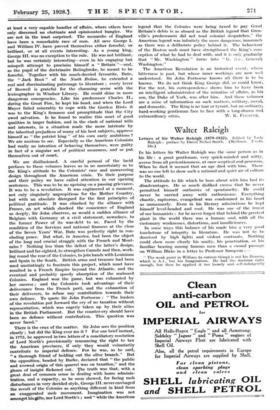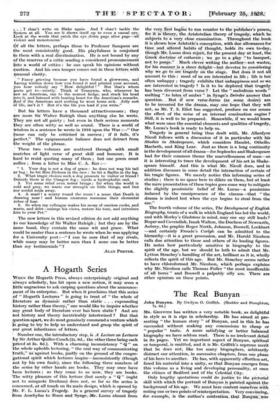Walter Raleigh
IN his letters Sir Walter Raleigh was the same person as in his life : a great gentleman, very quick-minded and witty, averse from all pretentiousness, at once sceptical and generous. When he died it seemed that an age died with him. There was no one left to show such a rational and quiet air of culture to the world.
The attitude to life which he bore about with him had its disadvantages. He so much disliked excess that he never permitted himself outbursts of spontaneity. IIe could' never be carried away with enthusiasms. Everything chaotic, rapturous, evangelical was condemned in his heart as unmannerly. Even in his literary admirations he kept himself level-headed and cool. He was one of the truest of our humanists : for he never forgot that behind the greatest giant in the world there was a human soul, with all the customary weaknesses, distortions, and insufficiences.
In some ways thiS balance of his made him a very good touchstone of integrity in literature. He was not to be deceived by high lightg and violent contrasts. Nothing could show more clearly his sanity, his penetration, or his familiar bearing among famous men than a casual passage" on 'William Blake in a letter to Professor Sampson " The weak point in Williatn (a curious thing) is not his Reason, which is A.1., but his Imagination. He had the doctrine right enough, but then he applied it too loosely and self-indulgently s shan't write on Blake again. tend: 1". shan't tackle the-
System at all. You see it shows itself up to even a casual eye.
Look at the words that catch the eye down page after page all, violent and monotonous."
Of all the letters, perhaps those to Professor Sampson are the most consistently good. His playfulness is conjoined in them with a real diserimination. He is not bound by any of the reserves of a critic sending a considered pronouncement Pito a world of critics : he can speak his opinions without Caution. And his own temper comes out in these letters with pnusual clarity.
having Fancy grieving because you have found a glowworm, and having written down how you found it and 'printed your account, you hear nobody say " How delightful ! But that's where poets get to—mostly. Think of Tennyson, who, whenever he :taw an American, ran to the nearest hedge, and stuck his head mato it, and listened with beating heart for the American's remarks. And if the American said nothing he went home sick. Jolly sort Of life, isn't it t But it's the life you lead if you write."
' But his letters have a thousand attractivenesses ; they are more Sir Walter Raleigh than anything else he wrote.. They are not all gaiety ; but even in their serious moments 'they are often witty as well as sound. There is a world of ;wisdom in a sentence he wrote in 1916 upon the War :—" Our iause can only be criticised in success ; if it fails, it's Perfect." the epigrammatic balance does not detract from the weight of the phrase.
These two volumes are scattered through with small snatches of light verse of great skill and humour. It is hard to resist quoting many of them ; but one poem must suffice ; from a letter to Miss C. A. Ker :—
" 1. Your dog is not a dog of grace : he does not wag his tail or beg : he bit Miss Dickson in the face : he bit a Baillie in the leg.
• 2. What tragic choices such a dog presents to visitor or friend ! Outside there is the Glasgow fog ; inside a hydrophobic end.
3. Yet some relief even terror brings ; for when the world is cold and grey, we waste our strength on little things, and fret 'bur sordid souls away.
4. A snarl ! a scurry round the room ! a sense that Death is :drawing near ! and human creatures reassume their eleniental robes of fear.
5. So when my colleague makes his moan of careless cooks, and .warts, and debt—enlarge his views, restore his tone, and introduce him to your Pet."
The new letters in this revised edition do not add anything ID our knowledge of Sir Walter Raleigh ; but they are by the as
me hand, they contain the same wit and grace. What could be neater than a sentence he wrote when he was applying for a University post I can be sure that of my rivals, while many may be better men than L. none can be better than my testiinonials " ? . ALAN PORTER.









































 Previous page
Previous page